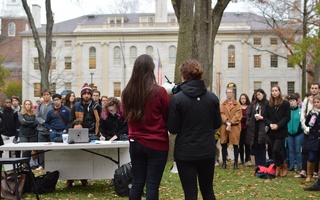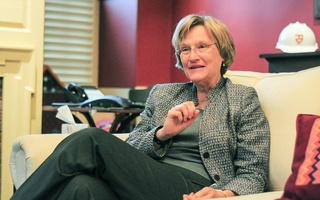{shortcode-9912b2a7d70e32d78e2aa8950ce6df1439b12859}
With the #MeToo movement still sweeping the nation, University President Drew G. Faust and the deans of Harvard’s 12 schools spent their most recent deans’ council meeting discussing sexual harassment and how #MeToo might affect the University’s sexual assault policy.
The deans’ council comprises Faust and the deans of all Harvard’s schools; Faust convenes the body on a regular basis to discuss University-wide issues and initiatives. In an interview earlier this month, Faust said that, at the latest meeting, she and the deans even practiced going through some potential sexual harassment cases that might arise at Harvard.
“We also did some cases—made up instances where deans talked about what would you do in this instance,” Faust said. “I think it was a very effective way of pointing out some of the challenges that the deans may face in their capacities as the leaders of their schools.”
More broadly, Faust said the council will seek to prioritize addressing sexual assault at the University going forward.
“A far more important role for this group is to take on big problems like sexual harassment, like Title IX, like conflict of interest issues and policies,” Faust said.
The #MeToo movement has so far focused largely on the entertainment industry, unearthing sexual misconduct perpetrated by media moguls including Harvey Weinstein. But there is action at the university level, too.
Students on campuses across the country have rallied to share concerns over their schools’ sexual assault policies in the wake of U.S. Secretary of Education Betsy DeVos’ changes to Title IX guidance. In Sept. 2017, DeVos raised the required standard for proof of guilt in sexual assault cases.
Harvard’s acting Title IX Officer later said DeVos’s decision would not change the University’s policies regarding sexual assault. Harvard currently uses the lowest standard of proof.
Faust said she hoped the #MeToo movement has made clear how important “effective” and “active” listening is when examining issues of sexual harassment and sexual assault. She called on the Harvard community to continue to listen in this manner.
“I do think that this is a changed environment for issues having to do with sexual harassment and that gives us an opportunity to look really hard at our own policies and procedures,” Faust said.
She said the #MeToo movement means Harvard must consider how to ensure sexual misconduct does not occur at the University and that no individuals—whether students, professors, or employees—are “marginalized or demeaned or traumatized” by sexual harassment.
In addition to encouraging Harvard affiliates to be better listeners, Faust also said she hopes the #MeToo movement means those at the University—and elsewhere—will feel more able to speak out.
“If individuals have felt unable to speak, I would hope the MeToo movement has encouraged them to,” Faust said.
—Staff writer Paula M. Barberi can be reached at paula.barberi@thecrimson.com. Follow her on Twitter @paulambarberi.
Read more in University News
Past Hints at FutureRecommended Articles
-
 Title IX Officer Mia Karvonides to Leave Harvard
Title IX Officer Mia Karvonides to Leave Harvard -
 DeVos Title IX Review Sparks Concern From Activists
DeVos Title IX Review Sparks Concern From Activists -
 Faust Talks DACA, Title IX in CBS Interview
Faust Talks DACA, Title IX in CBS Interview -
If Betsy DeVos Won’t Do It, Harvard MustHarvard must combat the narrative of DeVos’s decision—automatically doubting survivors’ allegations of sexual assault—and, instead, fully attend to students involved in sexual harassment cases.
-
 From Conversation to Policy
From Conversation to Policy













